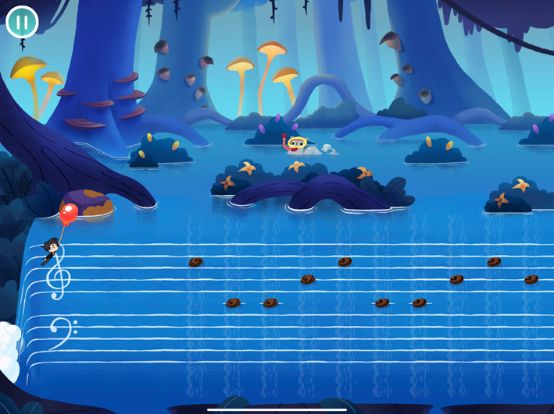Tuny hops from note to note
Reading music is a challenge for children and remains one of the most important areas of learning in instrumental lessons, even in the age of digitalization. How should it be tackled? For example with "TunyStones", an app developed in Basel.

When I was hired at the Basel Music School in 2016, I wanted my piano students to have as smooth a start as possible in the fascinating world of piano literature. The aim was to keep the beginners motivated and, even more importantly, to ignite passions. But how should one deal with the often tedious but important task of reading music? I invented a game.
-

Picture: TunyStones
First, I drew a mountain landscape on paper, with a wide river in the foreground, lines of notes and the bass and treble clefs. Then I drew notes into it. Lying in the "water", they looked like round stones in a mountain stream. All in all, the picture corresponded to both the notation system and a fantasy landscape. A likeable character was not long in coming: Tuny. I immediately cut out the finely dressed little man and attached him to a thin stick to move him along the river. The first analog prototype was ready and the game could begin: The six-year-old beginner plays notes on the piano and Tuny, guided by the piano teacher's hand, jumps from stone to stone accordingly. As we all know, finding notes is not always easy, so Tuny and his fine concert suit occasionally end up in the water instead of on a stone. The pupil giggles at the sight of this and the game continues: the river washes the soaking wet fellow back again and the jump has to be attempted once more. In their eagerness to play, the children hardly notice that they are doing nothing but reading music. They cheerfully pursue the task, which not infrequently triggers their displeasure at the sight of "normal" notes.
The piano becomes a "game controller"
The positive learning effects of the tool soon became apparent, and the analog prototype was turned into the app as part of a research project at the FHNW School of Music from 2018 to 2020. TunyStones - Piano developed. Today, the app is a sophisticated set of methods that uses improvisation and composition tasks to provide additional motivation, education and stimulate creativity. Its purpose is to promote and maintain the motivation of pupils on the one hand and to support teachers on the other. It allows them to explore and learn to understand the notation system largely independently, as the app recognizes the real, acoustic sounds of a piano and automatically moves the playing figure according to the notes played. The tablet stands on the music stand like a sheet of music. The piano becomes a kind of "game controller" and remains a musical instrument at the same time.
-

Photo: zVg
No prior knowledge is required to use the app, as the game is non-verbal and self-explanatory. A rough orientation in the notation system is first introduced by means of improvisation, then the musical intervals gradually appear in familiar melodies as well as reading etudes composed especially for the game. The app is also an unprecedented, interactive music book. In lessons, I recommend using the app "for dessert", i.e. towards the end of a lesson. Reading sheet music in this way is popular with five to twelve-year-olds and can refresh even tired minds so that they can overcome cognitive hurdles. It is a particularly welcome enrichment for daily and independent practice at home.
Three levels to your own creativity
The play landscape, a fantasy world similar to the Alps, was created by Adorabelle Tan and Cindy Chuang. Three maps provide an overview of the progress made. In the first two, the melodies are arranged according to their didactic content and level of difficulty. The closer you get to the mountain peaks, the more challenging the tasks become. As soon as you have conquered the first mountain, you can climb the second with its characteristic two peaks.
The crowning glory of the game is the third - the composition mountain: here, everyone becomes a composer and can create their own melodies and levels. But beware: Tuny is about to appear and has to master what you have composed, including all the jumps! A learning process takes place that goes beyond simply reading music and has a lot to do with creativity, but also with self-assessment. Teachers can also use the highly sought-after composition mountain with individually tailored miniatures for the pupils. These can then be played directly in class or used as homework.
Fruitful interface between music school and research
The development of the app was decisively supported by the Swiss National Science Foundation and Innosuisse. The Musik Akademie Basel campus was the ideal location for research and development, as it provided an inspiring environment for synergetic interaction between the practice at the music school and the research at the FHNW School of Music.
Many parents, pupils and, above all, teachers played a decisive role as test subjects. Their ideas directly influenced the development of the method. User feedback is also welcome after the launch. For the time being TunyStones is available for iOS tablets (iPads) in the App Store - free of charge for teachers in Switzerland (create an account in the app, access authorization is granted within a few days) and for pupils on a subscription basis. Further development for other instruments and Android is planned.
How to find TunyStones:
TunyStones - Piano in the App Store search or directly via the link:
https://apps.apple.com/ch/app/tunystones-piano/id1529100904
Free access for teachers in Switzerland:
Simply create an "account" in the app. Access authorization will be granted within a few days.
https://tunystones.com







